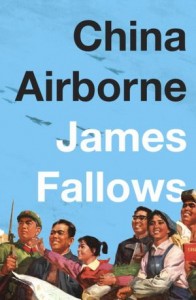
Let me admit it up front: Few topics could bore me as much as avionics and the aerospace industry. I only want to know that my pilot can take off, get me to where I want to go and land the plane safely. I don’t really know the difference between the words “avionics” and “aerospace.” So I approached China Airborne with a touch of trepidation: How could I possibly enjoy a book about a topic I find dryer than dust?
Leave it to James Fallows to take a subject to which I am indifferent (if not downright hostile) and turn it into a story of suspense and adventure, human and technological, and to delight me with every page. Yes, China Airborne is about aviation in China, how it started, how it has evolved and where it’s heading, yet the book transcends its ostensible subject, which Fallows uses as a metaphor for China’s evolution in general, for its advancement into the modern era, and all the challenges it faces as it seeks to break away from its role as the maker of goods designed by others to a nation that actually pioneers new technologies.
Before the 1990s China’s aviation industry lagged drastically behind that of the developed world, to say the least. Most of the planes were Russian made, the airports were primitive and few, and its safety record atrocious. Now China is home to some of the world’s most impressive airports, its aviation industry is growing at breakneck speed with billions of dollars in government funding, and it boasts one of the highest air safety records in the world.
How China got here is a breathtaking story, a story of China’s famous “can-do” attitude and willingness to throw itself into the projects it sets its sights on. An important part of this story and one the Chinese are less likely to talk about is the role of US entities, especially companies like Boeing and engineers and contractors from US agencies, which guided China along the way over the decades. Fallows charts China’s progress during these years and introduces us to the cast of characters who possessed the vision, the skills and the sheer bravura to move China’s aviation industry into the modern age.
Fallows’ description of the proposed development of an avionics research center in a remote area outside of Xi’An immediately brought to mind a chapter in Peter Hessler’s Country Driving, where he describes the building of a factory in China that plans to manufacture the little metal rings that hold brassieres together. They have no customers, no plans for sales or marketing, no business infrastructure, yet they pour money into building the factory, get it going into full swing and hire a complete staff. Eventually, after several months, they begin to get customers. Build it, and they will come. The same, it seems, with this aviation center and its grandiose plans to transform the region to attract tourists and become China’s center for aviation research.
Fallows describes how projects like these begin at the local level in China, the first step being winning the blessing of local officials and convincing them of the financial rewards to their region. A lot of guanxi is expended along the way. The dreamers will worry about getting the central government involved later. The avionics center project was immense, and Fallows’ descriptions of the building of runways in what was essentially the wilderness are amusing but also so quintessentially Chinese — we can do this, and we can do it on a grand scale! The obstacles they face — and there will be many — can be dealt with later.
A pilot himself (the book begins with his preparation to co-pilot the first Cirrus jetplane in China), Fallows obviously loves this topic. The breadth of his knowledge is sweeping and I closed the book rather amazed at all I had learned about what it takes to manage international flight, how today’s jets are built, how new GPS systems are changing how pilots take off and land and making it possible to put up runways even in remote rugged mountain terrain in Tibet. As I started the book I didn’t really want to know about these things, but I was quickly engrossed.
To a large extent this book is about China’s efforts to adapt to an age when leading an industry means opening up your people’s minds to new ideas, to new ways of thinking, to sharing knowledge and information. The last quarter of the book is less about flight and more about the Chinese government’s conflicting interests, ones we’ve discussed so many times here: retaining control and directing people’s thoughts vs. opening up and encouraging talent to blossom. If China wants to be on the frontier of the aerospace industry it needs to draw talent from all over the world. It will have to loosen the military’s grip on who controls the skies so the industry can operate without ridiculous and irrational restrictions. Fallows makes the point more than once that China has the hardware, the money and the facilities
but it lacks the “soft” ingredients necessary for a fully functioning, world-leading aerospace establishment. These include standards that apply consistently across the country rather than depending on the whim and favor of local potentates. Or smooth, quick coordination among civil, military and commercial organizations. Or sustaining the conditions — intellectual property protection, reliable contract enforcement and rule of law, freedom of inquiry and expression — that allow first-rate research-and-developments institutions to thrive and attract talent from around the world.
If China can succeed fully in aerospace, then in principle there is very little it cannot do.
Fallows doesn’t pretend to be a prophet and he leaves this question open. But he is clear about one thing: without the requirements he lists, without greater rule of law and respect for contracts, without protection of intellectual property, China will surely fail to meet its objective. It will not lead the world in technology and innovation. The book is all about China’s dreamers and their dreams. It would be such a pity to see China’s inflexibility and insecurities hold its people’s dreams back.
Boeing and Airbus see China as its most promising market and have agreed to joint ventures that involve the sharing of technology, despite the risks, because they know this is where the customers of the future are. China will play a huge role in the assembly of today’s incredibly complex jetliners, just as it does with iPhones. It will be buying more aircraft than any other nation. But can China design the next jetliner or iPhone?
It cannot, Fallows argues, unless it embraces “the openness and experimentation that world leadership in fields like aerospace would demand.” China now shields its people, protects them from “harmful content” on the Internet, which Fallows says makes many Chinese feel “infantilized and diminished by this reminder that they’re not quite part of the modern world.” China has to deal, too, with its paranoia and prickly sensitivities, its inability to deflect incidents like Liu Xiaobo’s winning the Nobel Peace Prize instead of being thrown off balance and revealing its insecurities to the world. There’s a lot about China’s thirst for soft power, and how it always gets put onto the back burner behind China’s No. 1 priority, internal stability and complete power of the party.
I bookmarked so many passages in this wonderful book, and I can’t go into every aspect of it that I enjoyed. It is about so much more than I can say here. It’s worth reading just for Fallows’ description of how he and his wife were bullied by plainclothes police at Tiananmen Square on the 20-year anniversary of the June 4th crackdown (an incident he blogged about at the time).
You come away from this book so impressed with what China has done and can do, with just how extraordinary its progress has been and how its authoritarian system has, so far, worked well enough that most people in China would say their lives are better off today than they were twenty or thirty years ago. But you also come away with strong doubts about China’s ability to rise to the next stage of power, where its people’s creativity and imaginations are unleashed, and where universal laws are respected. Where China becomes a true global citizen, concerned not so much with the specialness of China but with China’s role as a world leader. (This discussion of how China fosters the notion of its own uniqueness, with 5,000 years of history, as opposed to its place within the world community as a nation that cares — or at least pretends to care — about other nations aside from itself is one of the most fascinating in the book.)
All readers of this blog will enjoy China Airborne. Fallows’ accumulated wisdom of living in China, starting with his first visit there in 1986, pervades every page, and you will be thinking about where China is heading for a long time after you put it down. I can’t recommend China Airborne highly enough.


Comments